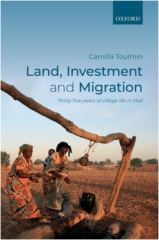
« While this book documents how life has changed for the villagers of Dlonguébougou in central Mali over the last four decades, it shows it to be a microcosm of powerful forces playing out in different ways across the African continent. «
Camilla Toulmin’s book spanning the last 35 years explores the many forces and pressures facing people and their families in Dlonguébougou, Mali.
What can the study of a single village tell you about a large diverse region like the West African Sahel?
While this book documents how life has changed for the villagers of Dlonguébougou in central Mali over the last four decades, it shows it to be a microcosm of powerful forces playing out in different ways across the African continent. Having data and evidence over such a long period allows you to see beyond the immediate headlines, and grasp underlying trends.
Whatever else may have changed over half a lifetime, daily life in Dlonguébougou remains highly seasonal. I was last there in late May, when the ground was parched and thick red dust collects in every crevice. The prospect of forthcoming rains is visible in the wild jasmine flowers and distant puffy clouds on the southern horizon.
Setting out to visit Dlonguébougou as the rainy season begins is an uncertain journey, along deeply rutted tracks that wind through the scrubby bush. You can easily mistake a field track for the road and end up in a big ploughed field or, worse still, run the risk of a night in the bush, the car stuck axle-deep in a muddy pond.
The landscape is lush after the rains start, with newly sprouted fields of millet and sesame greening up, and pasturelands thick with grasses. Later in the rainy season, as the millet reaches its full height, villages are hidden behind a green wall three metres high, the ripening spears of grain nodding as you pass.
Making the most of the short rainy season is critical to filling the granary – the cereal must feed the family for the next 12 months. But getting a good harvest is harder than before, and many of the big granaries lie broken and empty.
Land which once seemed so abundant, is now scarce. From Dlonguébougou northwards, there had been a huge expanse of open bush, with only the rare encampment of herders. In 1980, the village chief said confidently “the bush is so big, it can never finish”, yet 25 years later he sorrowfully admitted it had come to an end: “It’s finished, it’s ruined…”.
Forced from their land
How could such land abundance turn to scarcity in this short a time? Population growth has been part of the story, with a trebling of the village population over the last 35 years. But the main cause stems from promises made in the capital Bamako, and decisions taken in Beijing.
Several villages, 50km away from Dlonguébougou, have been turfed off their ancestral lands to make way for a large sugar-cane plantation. One day in 2010, these villagers were called to a meeting with government officials.
They were told their land had been given to a Chinese company, who would give them lots of work and provide schools and clinics. Two weeks later, the bulldozers arrived, churning up their plots, cutting down their fruit and shade trees and uprooting the baobabs which had stood guard over their settlements for many generations.
Hundreds of farmers needed to find land urgently to grow food for their families. So they set off north and westwards to ask for help from friends and relations in neighbouring villages.
Unmet promises
Although their villages had been settled since pre-colonial times, the government of Mali has the legal right to take land for projects intended to benefit the nation, but should compensate the evicted for their losses.
Ten years later, the farmers are still waiting to be paid and still waiting for the jobs, schools and clinics. And, as they say, even if financial compensation finally arrives, what will they do with it?
Above all, they need land, and must beg it from villages like Dlonguébougou, which now hosts more than 70 farming households who have come seeking land to cultivate.
Soil: no power left
Land shortage around Dlonguébougou means crop yields have fallen. Farmers used to rely on livestock dung to keep their fields fertile but, with many more fields being cultivated, grazing has run scarce, and there is not nearly enough fodder to feed the animals. With less dung, soil fertility has declined, and can no longer nourish a healthy crop – they say « our soils have no power left ».
A changing climate has also led to poorer harvests. The total amount of rain the villagers now receive has actually risen a lot since the 1980s, but it falls in a small number of big storms, which flood the land and settlement, rather than light rains needed to moisten the soils.
